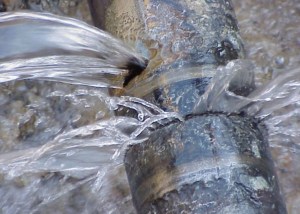Its one of my bugbears.
The number of people that I speak to that don’t know where the stop cock in their house is.
It’s one of those bits of information that you never think you’ll need… that is until you do – and then usually its an emergency.Being able to isolate the water supply into your home quickly in the case of a flood or plumbing catastrophe could save you a lot of wet towels, wet clothes and wet mood. The damage caused by a leaking or burst pipe could run into thousands of pounds (according to Water Safe up to £7500) and yet it is easily prevented.
Firstly, it’s worth visibly checking all the water pipes coming into or out of your property that don’t get heated. This check should also include taps and tanks too. If they are vulnerable to freezing then you can lag them with foam insulation – which costs little and is easily available from DIY stores or online. Just cut the foam insulation to the length of pipe and secure it with cable ties. Thermal ‘jacket’s for outdoor taps also cost only a few quid.
As temperatures start to drop and we’ve experienced the first ice and heavy frost of the Winter, whilst your at it do a pre-winter check up of your home. Here’s just a few things that you can do:
1. Firstly clear gutters of leaves and debris following the autumn fall and make sure that all downpipes are clear and run efficiently into a drain.
2. If you have an open fire have it cleaned by a chimney sweep. Debris such as leaves and bird nests could become a fire hazard.Invest in a chimney pot cover to prevent stuff entering this way (Santa knows how to still get through) and also check for any debris and cracks in the chimney itself.
3. Remove any dead tree branches that are at risk of falling and cause damage to your property. If they’re high up or awkward to reach, get a professional tree surgeon in.
4. Repair any steps leading to your home now too. They may be a trip hazard, but if they get icy too then you or a family member could be in for nasty fall.
5. If you’re planning on being away a day or two at Christmas, keep the central heating on its timer so it will come on for a short while a couple of times a day.
6. Store garden furniture or cover it with a tarpaulin or customised cover. This will protect it from the elements over the coming months.
7. Make a visual check of your roof to check if there are any broken or slipped tiles up there. High winds and snow (if we get it) might be all that’s need to dislodge them completely.
8. Get your boiler serviced – or ensure that the service schedule is up to date. If it’s having any issues, call a gas engineer out to check it over and make any necessary repairs. There’s nothing worse than no heating or hot water and if this happens over Christmas then its doubly bad.
9. If you’re home is prone to damp, consider purchasing a dehumidifier to put in rooms that are susceptible. Remove furniture away from these walls to allow as much air flow as possible and try to remedy the cause of the damp.
10. Check garden fences to make sure they are sturdy and well supported.
If my holly tree is anything to go by – its currently sporting a bumper crop of berries – then according to the old wives tale this means we’re in for a hard winter. We’ve had enough to deal with this year so don’t risk making the first part of 2021 unnecessarily costly and take a few simple steps now.

